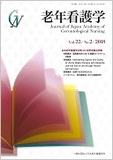Japanese
English
- 販売していません
- Abstract 文献概要
- 参考文献 Reference
抄録
本研究の目的は,施設に入所している認知機能障害のある高齢者の夜間睡眠の実態を把握し,さらに夜間睡眠とADLおよびBPSDとの関連を明らかにすることとした.介護老人福祉施設/特別養護老人ホームに入所中の認知機能障害のある高齢者39人を対象に,センサーマット型睡眠計を用いて夜間睡眠を測定しADLおよびBPSDとの関連の検討を行った.
その結果,対象者の平均総睡眠時間は503.3(±122.3)分,平均睡眠効率は75.0(±17.6)%であった.ADLが高いほど,在床時間が短かったが,ADLと総睡眠時間や睡眠効率との関連はなかった.BPSDがある人ほど,総睡眠時間が少なく,睡眠効率が低く,入眠潜時と中途覚醒時間は長かった.
BPSD出現や頻度が高い認知機能障害のある高齢者は睡眠障害を伴っている可能性が示唆された.本研究の結果は,認知症や認知機能障害のある高齢者のよりよい睡眠へのケアを検討するための一助となると考える.
In this study, we aimed to investigate the nighttime sleep-wake patterns of institutionalized elderly people with cognitive dysfunction, and to clarify the relationship between sleep disorders, activities of daily living (ADL), and behavioral and psychological symptoms of dementia (BPSD). Nighttime sleep was measured using a sensor mat sleep meter in 39 elderly participants with cognitive dysfunction living in a facility covered by public aid providing long-term care to the elderly (an intensive care home for the elderly). Furthermore, we assessed the association of our sleep-wake results with ADL and BPSD.
Our results showed an average sleep time of 503.3 min (±122.3) and a mean sleep efficiency of 75.0 % (±17.6). The more active our participants were (higher ADL), the shorter was their sleep time. However, we did not observe any associations between ADL and the total sleeping time or sleep efficiency. Moreover, the sleep time of participants with a higher level of BPSD was shorter than those with lower levels of BPSD. In addition, high BPSD participants had lower sleep efficiency, longer sleep latency, and more wake time after sleep onset.
It is suggested that elderly people with cognitive dysfunction and a high incidence or frequency of BPSD may have comorbid sleep disorders. We believe that the results of this study will help inform better sleep care practices for older people with dementia and cognitive dysfunction.
Copyright © 2018, Japan Academy of Gerontological Nursing All rights reserved.


